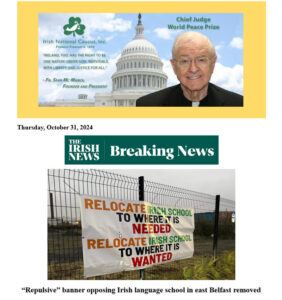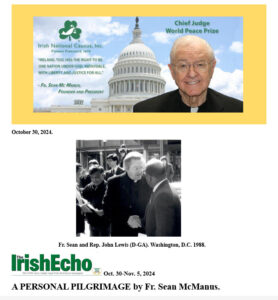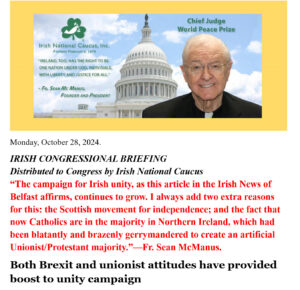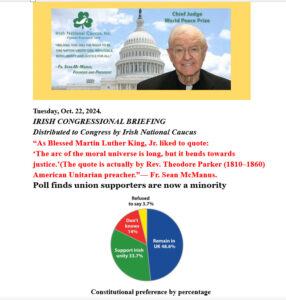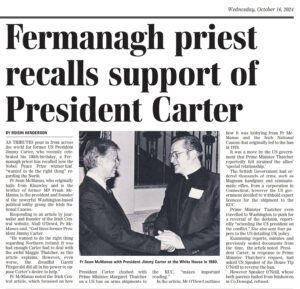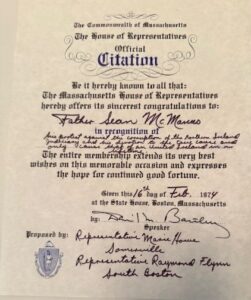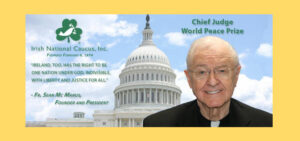
PRAISE FOR FR. McMANUS AND HIS WORK. McManus and his work
“Thus, McManus became Britain’s nemesis in America, the driving force that would eventually erode Britain’s influence within the U.S. government.”—Joseph E. Thompson. American Policy and Northern Ireland: A Saga of Peacebuilding. 2001.
“The Mac Bride Principles—a corporate code of conduct for American companies doing business in Northern Ireland—were launched by the Irish National Caucus on November 4, 1984. The Mac Principles both symbolized and effectuated the Caucus’ major campaign to stop U. S. dollars subsidizing anti-Catholic discrimination in Northern Ireland. The Principles became law in 18 U.S. states and numerous towns and cities. In October 1998, the MacBride Principles were passed by both the U.S. Senate and the U.S. House of Representatives and signed into U.S. law. Chairman Gilman took to the floor of the U.S. House of Representatives to welcome this singular achievement, saying: “I want to make a special note regarding Father Sean McManus. No one has fought harder against discrimination in Northern Ireland. Father Sean single-handedly brought the MacBride fair employment principles to … enactment.” — Chairman Ben Gilman (R-NY), October 1998.
“I know that Father McManus has moved the needle [on justice and human rights], and, Father, for that, I offer you, on behalf of the entire AFL-CIO, a sincere Thank you.” — President Richard L. Trumka AFL-CIO, February 3, 2016.”
“Advising Congressman [Richard Ottinger, D-NY], and helping him in the talks [in Belfast] was Fr. Sean McManus, the Washington-based Redemptorist priest ordained in England and now a scourge of the British Government. The lime-and-so-da drinking cleric is not liked by British diplomats in the American capital, where he leads the Irish National Caucus, a lobbying group aimed at influencing American foreign policy with the target of Irish unity, freedom, and peace.”—“Americans in Ulster Maelstrom.” Daily Telegraph. London. August 18, 1983.
“The [MacBride] campaign is being run by the Irish National Caucus… The move, inspired by Father Sean McManus, who has been consistently opposed to British policy, is particularly well-timed. For even if the law is never passed, it provides an opportunity to link, however, tenuously, the issues of South Africa and Northern Ireland. The MacBride Principles also call for the same kind of affirmative action programs for Catholics which American companies already use in the employment of women and blacks in the U.S.A”— “New York Threat of Ulster Shares Boycott.” Will Ellsworth-Jones. The Times. London. January 6, 1985.
“Fr. Sean McManus is the man who put Northern Ireland on the map in America. As head of Washington-based lobby group the Irish National Caucus, which he founded in 1974, he continues to fight the fight over sectarianism and justice—British governments have been and gone, Fr. Sean is still here. He famously championed the MacBride Principles which called on US companies investing in Northern Ireland to operate a fair employment practice. It made him a hate figure for Unionists and a constant prick in the side of the British.”—Richard Sullivan. Sunday World. Belfast. January 4, 2018.
“After being ‘transported’ out of London 1972, [Church and State] sent Fr. McManus to far-flung America. …They thought it was a safe enough place to banish him after he attacked the British Government and its policies in [Northern Ireland] in the early 1970s. But how wrong [they] were. Some political observers in America say he was light years ahead of his time when he set up the Irish National Caucus to fight for justice and rights for [Catholics] back home in Northern Ireland.”—John Cassidy, Sunday World. Belfast. March 18, 2007.
“No one has done more than Father McManus to keep the U.S. Congress on track regarding justice and peace in Ireland. Indeed, I believe historians will record that no one since John Devoy (1842–1928) has done more to organize American pressure for justice in Ireland.”—Congressman Ben Gilman (R-NY), Chairman, House International Relations Committee. 2003.
“My American Struggle for Justice in Northern Ireland, and this Third Edition, is a hugely important book. It is probably the most significant memoir in the historiography of Irish-American nationalism since Recollections of an Irish Rebel (1929) by John Devoy.” —Washington Irish Committee.
“For the past nearly 50 years Fr. Sean McManus has been championing, almost single-handedly, the struggle for peace with justice for the partitioned six counties of “Northern Ireland.” His has been the constant voice keeping the U.S. Congress, international media, and the entire Irish-American community, informed and constantly up to date with the truth. He withstood attacks of the English Government for his relentless efforts in fighting for the ultimate adoption of the MacBride Principles. Fr. Sean’s ongoing work and efforts on behalf of Mr. Raymond McCord, a Protestant from Belfast, has become another example of his vital role in the search for peace with JUSTICE irrespective of one’s religion.“—Bob Bateman, Past National Historian, Ancient Order of Hibernians. AOH Liaison to the Irish National Caucus and Congressional Ad Hoc Committee for Irish Affairs (1976-1982). (Great-grandnephew of the Fenian Captain Timothy Deasy).
“[Fr. McManus] stood out against powerful forces in a fight for justice and fairness. I didn’t always agree with the causes he supported, but I admired his persistence, his courage, his relentlessness. And admiration that one person, almost alone, could make such impact on public policy in the United States.”—Vincent Browne’s speech at book launch in Dublin. 2011.
“Fr. Sean knows the history of the struggle for justice in Northern Ireland as well as anyone—he lived it. A very important book.”— Ray Flynn, former mayor of Boston and U.S. ambassador to the Vatican. 2011.
“Fr. Sean McManus has spent a lifetime leading the fight to achieve a peaceful solution to the conflict in Northern Ireland. That so many Americans and, particularly those in American government leadership roles, joined in the effort to achieve a peaceful resolution of the conflict is a credit to his courageous and inspiring leadership.”—Bill Flynn, Chairman Emeritus, Mutual of America chairman, National Committee on American Foreign Policy. 2011.
“The word I always associate with Fr. Sean McManus is adamantine (unbreakable):
Made of or resembling adamant. Having the hardness or luster of a diamond. I have seen him in action countless times on Capitol Hill, so I can fearlessly proclaim that his book will gleam with the luster of a diamond. Tolle, lege! [Take up and read].”
Tom Halton, Former Professor of Greek and Latin at The Catholic University of America. January 5, 2011
“A spiritual and magnanimous man, McManus is undeniably a brilliant tactician. His fine book chronicles a long and vibrant journey of an astute, intelligent, and politically committed mind in action. …Many elected American officials of all ethnic backgrounds were convinced by McManus of the urgency and legitimacy of the issue and became supporters of his unceasing efforts. His crowning achievement came when after a laborious campaign the MacBride Principles were signed into law by President Clinton.”—Joe Martin. Real Change. October 27, 2011.
“So, from Kinawley to the halls of Congress, your story—which I thank you for—is hard to put down. May this year be one of deepening justice and peace for Ireland.”—Jim Douglass, noted author on nonviolence. January 8, 2012.
“Fr. McManus … has released this must-read tome for anyone interested in the long struggle for full Irish freedom … The book documents the priest’s successful struggle to incorporate the MacBride Principles (business ethics for American companies doing business in the north of Ireland) into U.S. law. This is not a work of fiction, though the herculean task Fr. McManus set for himself and his Irish National Caucus lobbying effort on Capitol Hill would appear to qualify as such.”—Bryan T. McMahon. The Ponchatoula Times. Florida. June 28, 2013.
“As a writer, singer, and performer of Irish ballads, I know the value of voice, words, and thoughts that expose injustice (as this book does). Over the last 40 years Fr. McManus has been the powerful voice that has kept the U.S. Congress involved in the struggle for justice and peace in Ireland.”—Derek Warfield, (Young) Wolfe Tones. 2011.
“The intrepid Fermanagh-born battler for justice, Fr. Sean McManus, has published the definitive book on Irish-America’s fight for justice in the North of Ireland, including the epic MacBride Principles campaign.”—Máirtín ÓMuilleoir, Belfast Media, President of The Irish Echo. 2011.
No … U.S. initiative … [on Northern Ireland] would have come about had it not been for the activities of the Irish National Caucus. — Sunday News (Belfast), 1979.
“Perhaps the Caucus’ boldest success has been its efforts to create … The Committee for Irish Affairs.”—The New York Times. 1979.
“…The Irish National Caucus … has been influential in getting Congress to see Northern Ireland as a human rights issue.”—The Washington Post. 1981
“The MacBride campaign, directed by the Irish National Caucus won the support of the AFL-CIO and of several religious institutional shareholders including several Catholic orders and several major Protestant denominations.”—The Wall Street Journal.1988.
“It all started with Father McManus. When he came over here, we were all sympathetic to him.”—House Speaker Tip O’Neill (Irish America). 1986
“I support the Irish National Caucus because it represents a compelling voice for fair employment, legal justice, and lasting peace in Northern Ireland.”—Rep. Joseph P. Kennedy II (D-MA). 1988.
“Dear Fr. McManus … I would be honored to be a Congressional Friend of the Irish National Caucus. I support your nonviolent work for justice and peace in Northern Ireland with full equality for the Catholic minority. Additionally, I support continued American involvement in the Irish peace process.”—Rep. Joseph Kennedy, III, December 13, 2012.
“As Chairman of the Ad Hoc Committee for Irish Affairs, I … commend the Irish National Caucus for your steadfast advocacy on behalf of human rights …Fr. McManus is ‘The Apostle of Human Rights for Northern Ireland.’”—Rep. Mario Biaggi (D-NY). 1980.
“Thank-you [Fr. McManus] for your gracious invitation to become a ‘Congressional Friend’ of the Irish National Caucus. The warm welcome that I have received from the Irish people on my visits there has gladdened my heart and made me always hopeful that people throughout Ireland will live in a climate of peace and nonviolence.”—Senator Hillary Rodham Clinton (D-NY). 2003; appointed U.S. secretary of state by President Obama in 2009.
“I am a Protestant (which normally I would not mention). However, I had to turn to a Catholic priest, Father Sean McManus, to seek justice for the murder of my son, Raymond Jr. Father McManus helped me get a powerful Congressional hearing into young Raymond’s murder and expose state collusion in his murder.”— Raymond McCord Sr., Belfast. 2011.
“Fr. McManus, from his Capitol Hill office, has been a prominent and influential figure in the quest for progress and peace with justice in Northern Ireland, blending knowledge of his native land with experience drawn from his years of dealing with the intricacies of the political system in his adopted one. His has been a unique role. Long may it continue.”—Ray O’Hanlon. editor of The Irish Echo. New York. 2011.
“Fr. Sean McManus is a man to be reckoned with when it comes to advocating causes. His espousal of the MacBride Principles back in the 1980s caused fits for the British government … McManus has also been a constant watchdog in Washington on Irish affairs and has been hugely successful in setting the Irish-American agenda over the past 30 years.”—Niall O’Dowd. Editor of The Irish Voice, New York. 1990.
“The master … in publicity terms, is Father Sean McManus, a burly, plausible charmer whose Irish National Caucus has taken center stage … the good Father has made himself expert in congressional lobbying techniques … I spent a long and, to be perfectly frank, rather enjoyable afternoon with Father McManus in his Capitol Hill office … and it became clear that he hadn’t been raised as a clerical apologist for nothing.”—Christopher Hitchens, public intellectual, author of God Is Not Great, and The Missionary Position: Mother Teresa in Theory and Practice. The Spectator. England. October 5, 1985.
“We did not take him [INC President, Fr. Sean McManus] very seriously at first, but the MacBride Principles have caused serious problems and cost millions to try to counteract.”—A Senior British official in Northern Ireland—Sunday Life. Belfast).1992.
“The fanfare of publicity about new and tougher action against job discrimination, for example, is designed, at least in part, to help the British Government to counter the extremely effective campaign on the MacBride Principles which is being waged by the Irish National Caucus in the United States.”—The Irish Times. Dublin. 1987.
“I support the Irish National Caucus in its important work for justice and peace in Northern Ireland and would be proud to be associated with this worthy organization.”—Rep. Peter T. King (R- NY) 1994.
“It makes one want to stand up and cheer.” Author Sharon Chang, 2011.
“Northern Ireland’s most diligent champion in America.”— Sharon Chang. February 6, 2020
